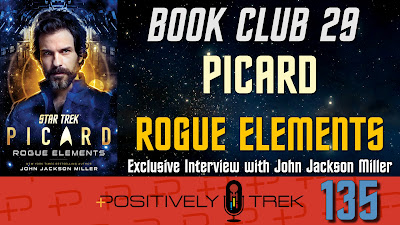I really enjoyed it too.
I also liked how JJM was shocked by one of his characters actions.
I also liked how JJM was shocked by one of his characters actions.
I have really liked the Picard books so far, more than the show itself honestly.
I love the show but I feel like the show would have been better received with THE LAST BEST HOPE or something similar as a pair of episodes before the series. A way to show everything before it goes to hell like the Battlestar Galactica miniseries.
I would definitely read a Rios series by JJM, though.
I enjoyed listening to your podcast interview with John Jackson Miller it certainly helped me understand the story arcs for Rios and the other characters better. I just finished the book it was really good.
To me, the show really fell apart after about 3 episodes. It tried to do too many things and honestly a lot of the elements didn't work together well in my opinion.
Just finished it. Having Fajo and Iotians as central characters was a negative. Raffi,Picard, and Batinides was neutral.

On p. 43, Rios mentions the song "Sledgehammer"... which gave me a good laugh when I remembered the music video.Has anybody attempted something like a definitive watchlist to get all the references in Rogue Elements?
I checked Memory Beta (the Memory Alpha article is still a stub) and they list some episodes, but I feel like there are a lot more. For example they don't include The Undiscovered Country, which I would think is a very central reference.
And on the more obscure side, there are episodes like The Trouble with Tribbles, which introduces Sherman's Planet, or the DS9 episodes that gave us the Miradorns. (For a ubiquitous species like Ferengi or Klingons or even Nausicaans I wouldn't expect a reference, obviously. But until I looked it up I couldn't remember if the Miradorns were a species that we had seen on screen before or if JJM made them up for the book.)
On p. 43, Rios mentions the song "Sledgehammer"... which gave me a good laugh when I remembered the music video.

It was nice to catch up with the Iotians and I mostly liked Miller's portrayal, that they largely continued in their gangster ways (which I prefer over the previous idea that they copied Starfleet because of the misplaced communicator). There were certain advancements and changes in Iotian culture as one would expect after a century, but they weren't just simple copycats. There were reasons they warmed to the gangster culture of the 1920s.
And it was interesting to see in some ways it was a sanitized version of gangster culture. They were dangerous and sometimes thug-like, but it wasn't as malicious as real gangster culture was in Earth's past.
I wondered if that was sort of a metatextual nod to how the episode's gangster culture was toned down for '60s broadcast standards, with all the seedier sexual elements censored out.
Yes, that certainly makes more sense. The original premise of the episode is anthropologically implausible and rooted in ethnocentric assumptions about why cultures adopt outside ideas. Just being blindly imitative makes no sense; who were the Iotians supposed to have imitated before first contact?
Really, the ending of "A Piece of the Action" makes more sense than some other Prime Directive stories, because it has Kirk accept that this is just the way the Iotians are now, and he works within their cultural norms to help them reform their society on their own terms, rather than saying "No, you must revert to the 'pure' culture you had before our 'contamination'" (which is nonsense, because every culture interacts with others and "purity" is a myth).
Indeed not. The Iotians had their own reasons for adapting "the Book" to their purposes, or adapting themselves to the stylings of "the Book" and Miller made that clear. They weren't idiots, but they were probably trying to save themselves from their own worst selves. Not unlike humanity in our particular here and now.
But I digress.
We use essential cookies to make this site work, and optional cookies to enhance your experience.
